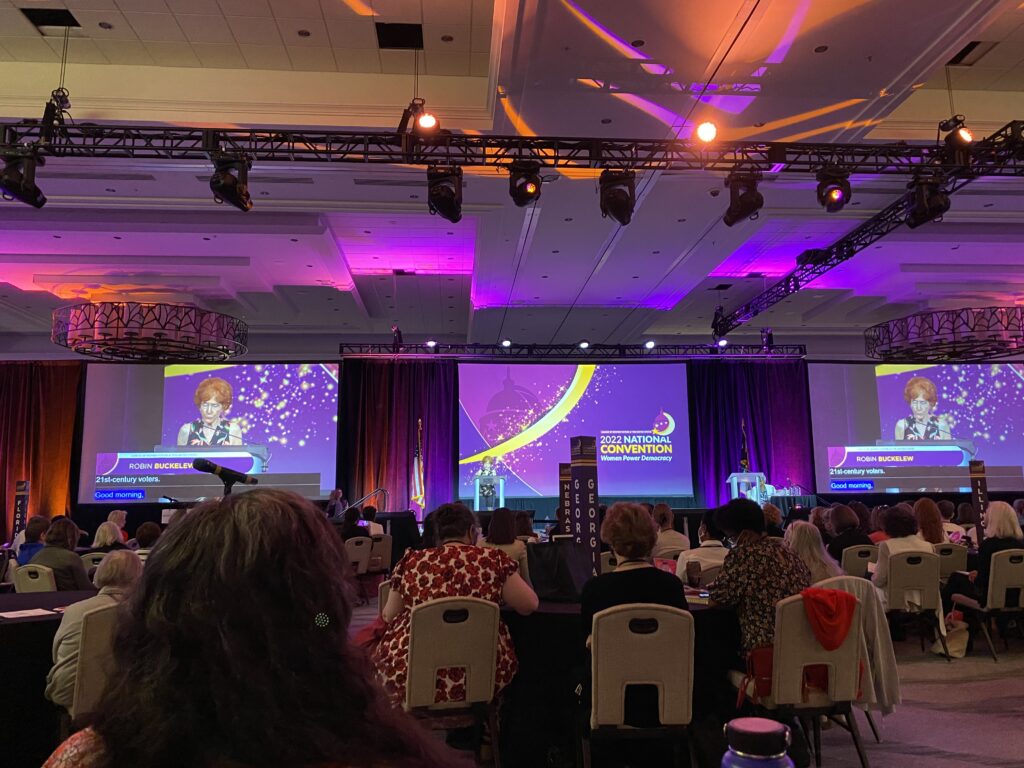By Ida Tyree-Hyche Hill, Esq. and presented by Dr. Robin Buckelew to the Convention of the League of Women Voters of the United States in Denver, CO on June 25, 2022.
I. Where were they?
There is a quote by Sydney J. Harris: “History repeats itself, but in such a cunning disguise that we never detect the resemblance until the damage is done.”
Earlier this week we celebrated the Juneteenth federal holiday, which recognizes the day in 1865 when enslaved people in Texas officially learned they’d been freed two years earlier by the Emancipation Proclamation. Here in the state of Colorado you also celebrated it as a state holiday. But Juneteenth did not mark the beginning of true freedom for black people. I call our attention to the League’s first national president, Maud Wood Park. She successfully steered the women’s suffrage amendment through Congress. But neither the suffrage movement, nor the League of Women Voters, included all women.
My namesake, abolitionist Ida B. Wells, was a feminist and leading advocate for Black justice. During her life, she founded civil rights and women’s suffrage organizations that played critical roles in advancing equity, including the National Association for Colored Women and the Alpha Suffrage Club of Chicago, the nation’s first Black Women’s club focused specifically on suffrage. As president of that club, Ida B. was invited to march in the Suffrage Parade in Washington, D.C. on March 3, 1913. On arrival she was told that women of color were asked to march at the end of the parade to avoid offending Southern white suffragists. Instead, she waited on the parade sidelines until the white Illinois group passed and joined those women as they marched.
Upon achieving suffrage, the League deliberately created barriers to prevent women of color from leading or joining the organization.
II. Where are we now?
The state legislatures now pushing to restrict voting access are both aggressive and successful. The Brennan Center reports about three dozen laws passed in 2021 restricting access to voting. The pace is accelerating during 2022, with legislation moving that disproportionately impacts voters of color.
Alabama’s long voter suppression history was ultimately codified in the 1901 state constitution. Convention Chairman John Knox opened the proceedings saying that the goal was “to establish white supremacy in this state.” The wealthy white political establishment was determined that the Black population (45%) would have no opportunity to join with poor whites to dominate state politics. Subsequently, Alabama enacted a poll tax, a literacy test, and property requirements for voter registration. People convicted of crimes “of moral turpitude” lost voting rights, and these crimes were ambiguously defined in order to further disqualify Blacks. Alabama brought the 2013 lawsuit (Shelby vs. Holder) that gutted the pre-clearance provisions of the Voting Right Act. Alabama officials continue to defend voter restrictions imposed during the past few years and to block new efforts to make voting easier. Alabama is one of 11 states that do not offer early voting; it also requires a photo ID and two witnesses or a notary to sign an absentee ballot. The state is currently appealing a lower court ruling that allows counties to offer curbside collection of absentee ballots. Today, lawmakers are seeking to suppress not just access to the ballot, but to criminalize the critical work that organizers do to help voters navigate complicated voting laws. House Bill 194, passed in 2022, makes it a crime for local voter education organizations to provide funds or services for collaboration with local (poorly funded) election officials.
III. Where do we go from here? What’s our roadmap to the future?
The League of Women Voters and its predecessor suffragist groups have always believed in the power of women to create a more perfect democracy. The League has long supported the now titled “John Lewis Voting Rights Act,” a bill that will restore US law to its 1965 protections by reviewing and blocking policies that target voters of color. Collaborative efforts are critical. Alabama is a state which is hyper partisan, polarized, and continues to marginalize and suppress the vote of poor and minorities. We work for incremental victories. Together with Greater Birmingham Ministries and Faith in Action Alabama, we have successfully negotiated a change in the Bureau of Pardons and Paroles interpretation of the law granting former felons their voting rights. We came very close, with our membership in the Alabama Voting Rights Coalition, to improving the law which restricts former felon voting rights, and we anticipate progress next session. This coalition has collaboratively developed a “platform” to grade prospective voter rights restoration legislation to determine whether it merits the coalition‘s support. We are working with the blind and visually impaired to support legislative solutions to allow them to vote with fewer barriers, and successfully stopped a bill last session that would have further disadvantaged those voters. With our partners, including the Alabama Non-Violent Offenders Association, we are gaining access to offender reporting centers to educate the formerly incarcerated on their rights, and to inform them of how to register. During redistricting hearings, League members testified and presented an alternative map as an example of one that could consolidate communities of interest. That map was subsequently championed by legislators in a lawsuit against the state. Ultimately, the effort of negotiating our various positions, standing in solidarity to speak out in support or opposition to legislative initiatives, and working through misunderstandings, is making us all stronger and is already making a huge difference for Alabamians.



